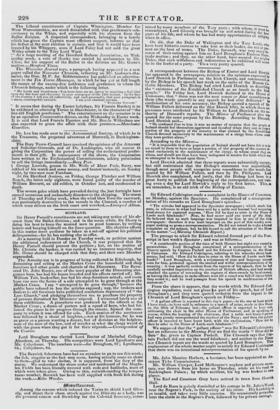A correspondence between the Bi i shop of Exeter and Lord Howick
has appeared in the newspapers, relative to the opinions expressed by Lord Howick in Parliament on the Irish Church, and commented ea by the Bishop in his speech last week on the oaths of the Roman Ca. tholic Members. The Bishop had cited Lord Howick as describing
i
the " existence of the Established Church as an insult to the bird people." On Friday last, Lord Howick declared in the House d Commons, that " there was not the most remote or faint resemblance to them (the words quoted) in any speech he had ever delivered." Is confirmation of his own accuracy, the Bishop quoted a speech of Si, William Follett delivered on the 31st March 1833, in which those en. pressions were attributed by Sir William to Lord Howick on the au. thority of Hansard's reports. The Mirror of Parliament also nu quoted for the same purpose by the Bishop. According to Hansard, Lord Howick said—.
"He confessed that to him it was no matter of surprise that the people of Ireland should feel themselves aggrieved and insulted when they saw so hrgss portion of the property of the country as that claimed by the Established Church devoted exclusively to the maintenance of a clergy from whose creel they were perfect aliens."
According to the Mirror- " It is impossible that the population of Ireland should not have felt it toile an insult to them to have so large a portion of the property of the country de. voted exclusively to the maintenance of the clergy, towhose creed they are aliens, and should not thus have been indisposed to receive the faith which was
so attempted to be forced upon them."
Lord Howick admitted that these reports were subtantially correct; but still maintained that the Bishop's statement was unjustifiable, though most people will recognize some resemblance to the words first quoted by Sir William Follett, and then by Dr. Phillpotts. Lord Howick also complained, and justly, that the Bishop bad been in s great hurry to publish the beginning of the correspondence, not wait. mg even a day for Lord Howick's reply to his first letter. This, N we remember, is an old trick of the Bishop of Exeter.


























 Previous page
Previous page